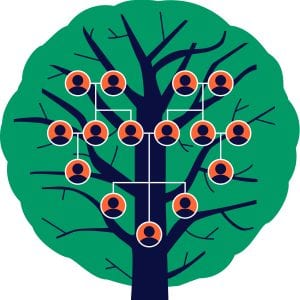 Genealogical research into your family becomes increasingly difficult the further back in time you go. This is doubly true for African Americans who are searching for their ancestors among the millions of enslaved people in the United States in the 1860s and earlier. However, while researching enslaved ancestors is difficult, it is not impossible. Here are some research tips and resources that you can use to break through into the past and find your family.
Genealogical research into your family becomes increasingly difficult the further back in time you go. This is doubly true for African Americans who are searching for their ancestors among the millions of enslaved people in the United States in the 1860s and earlier. However, while researching enslaved ancestors is difficult, it is not impossible. Here are some research tips and resources that you can use to break through into the past and find your family.
If you have never looked into your family history, our Checklist for Genealogical Neophytes, opens a new window article will step you through how to begin your search. If you have already worked your way back into the late 1800s, you are probably wondering where to go next. Here are some ideas on how to proceed.
First, try to find one of your ancestors on the 1870 census. FamilySearch, opens a new window has digital copies which you can access. Be sure that you have the correct person by aligning the names, sexes, and ages of their family members. Once you are sure you have the correct person, see if you can locate them in the 1860 census in the same area unless you know for certain that they moved. If they were not enslaved, you may find them on the 1860 census record.
If you don’t see them or you know that they were enslaved, there are many resources available for you to try. If you are searching locally, first try the Virginiana Room at the Fredericksburg Branch. There are several helpful resources there, including the Virginia Slave Births Index, 1853-1865, opens a new window, Local Sources for African-American Family Historians, opens a new window, family histories, court record indexes, will abstracts, and vertical files with information on local houses, people, businesses, churches, and more. The City of Fredericksburg Historic Court Records include the Free Negro/Slave Records search, opens a new window, which consists of indentures, certificates of freedom, bills of sale, manumissions, and more. The Library of Virginia’s Virginia Untold, opens a new window has numerous primary documents from before 1865 which are digitized and searchable. Also, FamilySearch has collected many resources on their African American Resources for Virginia, opens a new window page.
If local records don’t show your family or you are looking outside of Virginia, there are other avenues to explore. Try looking in the Freedmen’s Bureau records, opens a new window. This bureau, officially the US Bureau of Refugees, Freedmen and Abandoned Lands, was created after the Civil War to help fill the needs of the emancipated African American population, displaced persons, and abandoned properties. These records, dated from 1865-1872, include hospital records, labor contracts, school enrollments, marriages, rations, disputes and court cases, and more. A completely separate but valuable set of records are from the Freedman’s Banks, which were opened for African American workers to keep their money. Deposit records from numerous states exist in indexes and digital forms at FamilySearch and Ancestry.
Another avenue is to search backwards from your known 1870 census family members to the 1860 and 1850 U.S. Census Slave Schedules to see if you can find a family with the same members. Only ages and sexes are listed in these schedules, but, if you find a family in the 1860 census with the same family makeup as your 1870 family members only 10 years younger, especially in the same area, you may have found your family. If you find them again in the 1850 Slave Schedule, you could start searching the court records, wills, property records, and other records connected with the owner listed in the schedule to look for more information about them. Some of these records are online, but for some you may have to contact the locality or even visit to delve into paper and microfilm records.
While it may take some extra steps, a lot of perseverance, and a few dead ends, researching your enslaved ancestors is a possible and worthwhile pursuit.
Here are additional resources to help you fill in the gaps in your family history:
Books and websites with information on researching enslaved ancestors for family historians.

